The Rolling Stones at the Wall Fraud when buying freedom The most bizarre decisions in the Politburo Alied spies in the GDR The GDR and anti-fascism The GDR Indians under Stasi surveillance
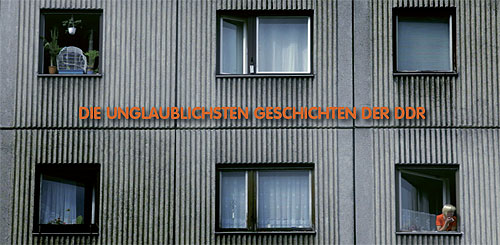

The Rolling Stones at the Wall Fraud when buying freedom The most bizarre decisions in the Politburo Alied spies in the GDR The GDR and anti-fascism The GDR Indians under Stasi surveillance
Prostitution, gay bars, and well-established pubs exist side-by-side with locally-owned snack counters and cafés. The people on the streets are of every age, nationality, attitude towards life, and social class. The local policeman Udo Lütje from the Reeperbahn’s famous Davidwache, knows everyone on the Talstraße. It is his favorite street on his beat. When he drops in to see Peggy, proprietress of the long-established pub Utspann, he always finds out what it going on in the neighborhood. Peggy’s customers are a mix of old and young, transvestites, gays, straights, and anyone else who happens to drop in. Someone such as Catrin Emmrich, the animal healer from across the street. She treats Peggie’s dog Sheila and can’t imagine a better place to live. Gökcan Durucan has a small shop on Talstraße and experiences the rough but warm way of St.Pauli locals every day. Domenica, a famous prostitute, dominatrix and streetworker used to live over his shop. He loves it here, where the people are bound together by opposites. Opposites such as in Dennis Trotzke’s life. He enjoys the relaxed atmosphere of the heterogeneous street and later, when the day and night shifts meet, he puts on his drag queen persona Valery Pearl and works as a DJ in the famous Wunderbar.
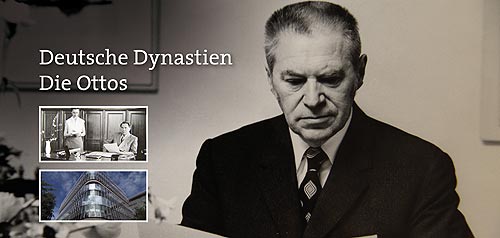
In 1949, Werner Otto left behind a bankrupt company to start a new mail order business. He had three employees, the first catalog was bound by hand, and it offered customers a selection of 28 pairs of shoes. In the next 10 years, “Otto” moved from its humble beginnings to become one of the leading German mail order companies. Today, “Otto“ is an international company with sales in the billions. It is the number one online retailer for fashion and lifestyle in the world. The family is one of the richest in the entire world, but the Ottos are rarely in the public eye. Even when they act as sponsors and patrons, they usually remain in the background. Who are the people behind the company name? Two of the sons have joined and are executives of the company, but the other three have made their professions in the arts and media. Few people even know that they belong to the Ottos. “The Ottos“ – a family history without hatred or intrigue. A success story from post-war Germany.

„Hot Spot“ takes us into the fascinating world of science and makes us marvel at the most diverse topics from medicine, energy, engineering, sports, nature, aerospace to automobiles. “Hot Spot” is showing trends which will influence our lives in the future. Extraordinary camera techniques and emotional stories paint a colorful picture of the German science landscape. “Hot Spot” is an international cooperation and is broadcasted on the Arabic television channel Al Arabiya. The science magazine is produced in German, English and Arabic language.
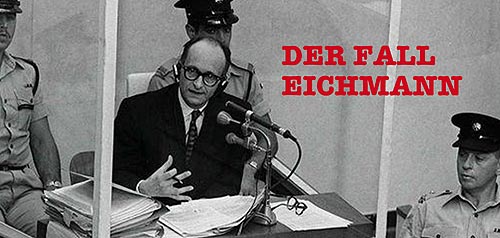
Eichmann, the former head of Jewish affairs at the Reich Main Security Office, one of the main organizers of the mass murder of European Jews, received help after the war from a network of sympathizers and went into hiding in Argentina. In 1960, the Mossad tracked him down, kidnapped him, and took him to Israel where he was put on trial a year later. While relatives and sympathizers organized Eichmann’s defense, the German government and the German Intelligence Service were anxiously trying not to be brought in connection with Eichmann and other Nazis crimes. Too many former important Nazis, including Chancellor Adenauer’s right hand man Hans Globke, were back in office, their pasts conveniently forgotten. When the press announced that Eichmann was going to sell out his co-perpetrators, the pressure increased. Adenauer then put out feelers to Ben Gurion to find out what Israel expected in return for keeping post-war Germany out of the trial. Loans which had already been pledged to the Israelis were temporarily frozen as leverage. The Israeli government finally relented and ordered the Attorney General to leave the Federal Republic of Germany out of the trial. Avner Less, who had seen through Eichmann’s lies after weeks of interrogation, was withdrawn from the proceedings. In his never-before published diary, he describes the confrontation with the perpetrator which lasted weeks. It and the tape recordings of the interrogation paint a fascinating psychological portrait of the Nazi criminal. In addition, this film by Ute Bönnen and Gerald Endres is the first to show who was pulling the strings in the background and what really happened behind the scenes in Israel and Germany.
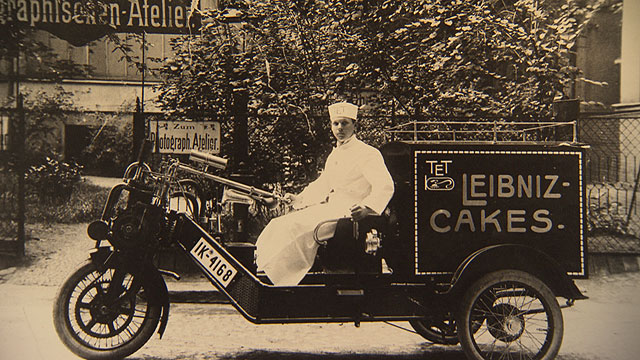
Bahlsen – biscuits off the production line The Leibniz butter biscuit has accompanied generations of children. The Bahlsen family has been producing biscuits and cakes in Hanover for almost 120 years and is the market leader in the German sweet biscuit market. Hermann Bahlsen is young, well educated and has a small capital. His business idea: with cakes – the English tea biscuit – he wants to make it big in Germany in 1889. His breakthrough comes with his Leibniz butter biscuit. The first assembly line in Europe runs in his “Cakes Factory” in Hanover. -Bahlsen is a pioneer who sets trends. Otto – With the catalogue to success It all started with the mail order of shoes in the 1950s, today the Otto family is one of the richest Germans. The start-up has become a global corporation, the core business then as now is mail order. Werner Otto had just gone bankrupt when he ventured a new start with a mail-order business with three employees in 1949. His first catalogue is hand-bound and customers can choose between 28 pairs of shoes. Within 10 years, “Otto” rises from a small “backyard company” to one of the leading German mail order companies. Today “Otto” is the second largest internet retailer in the world. Darboven – A life for coffee Hardly any company boss is as associated with his product as Albert Darboven is with his idea of coffee. He likes to extol the virtues of “stomach-friendly” in commercials, even in person. 150 years ago, the young merchant Johann Joachim Darboven in Hamburg was the first to pack his roasted coffee in bags. – A lucrative business, even today.
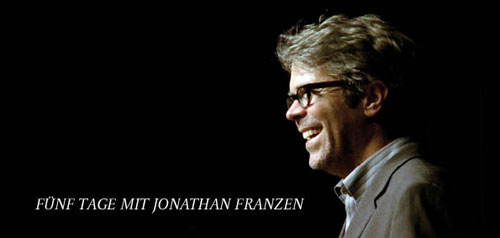
The film shows Franzen at his studio in New York where he worked on his global bestseller Freedom for more than ten years. The audience also follows Franzen for part of his busy promotional tour to Denver, Los Angeles and Sacramento. We also accompany him to the wilderness, only two hours away from Los Angeles, where Franzen observes birds at dawn before moving on to the tour’s next live television appearance. His German publisher, American agent, and his friends talk about their relationship with the world-renowned author and his amazing success on the international book market.
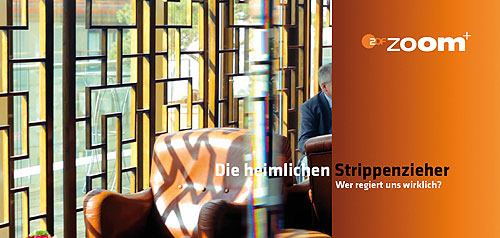
But how does a lobbyist do his job? How do they influence policy? How do they make sure their interests take precedence over others? And just how successful are they? Zoom-reporters Henno Osberghaus and Anna Grün went on the lobbyists’ trail and got an exclusive look into a world which normally remains hidden. Lobbyists don’t like letting others in on their secrets. That threatens their business model. Our reporters were able to accompany several lobbyists to work. For example, Helmuth Prinz, the head of the German Florists‘ Association, on his fight against an increase in the value added tax. They also met with Karl Jurka, a complete pro and “old timer” lobbyist who offers his services to anyone…if the price is right. And he makes no bones about it. The reporters accompanied these lobbyists as they met with Members of the Bundestag, made contacts and gathered inside information first hand. They led us to members-only places such as the China-Club. Lobbyists and elected officials meet there, so mere mortals have to wait at the door.
What in the world are countersunk screws and hog rings? And what is the purpose of circlips, Volo-hooks, and felt pads? When you enter the hardware store Ferd. Schüllenbach for the first time, you’re likely to feel a little lost. This store is located in Hamburg’s famous St. Pauli district, and its shelves and cabinets reach the ceiling, filled with countless little boxes, drawers with carefully written labels, household goods and locking systems. If you take a closer look, you’ll find a veritable treasure trove hidden behind the maze. Aenne and Clemens Flagge, representing the fifth generation of this family-owned business with cult-status, are happy to guide their customers through the labyrinth to do-it-yourself nirvana. “We still sell everything separately, and we offer spare parts for older models as well as technical advice. That’s how we deal with the competition from the home improvement stores,” says Aenne Flagge, the owner of the business. She sits like a regal matriarch at the register in the middle of the shop, passionately caring for her domain, running the business end of the shop while her husband Clemens and their three employees take care of the customers. They can always be counted on to find a solution to the customers’ problems, no matter how vague the description. The witty commentary from the sales staff is thrown in for free.
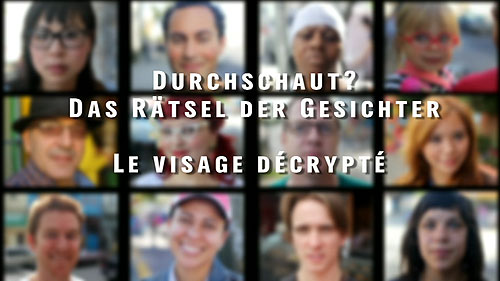
Dr. Paul Ekman, a psychologist who lives in San Francisco, is known for being able to see through every facial expression and every gesture a person can make. His knowledge has inspired international intelligence agencies as well as Hollywood. It provided the plot for the successful crime series Lie to Me, which revolves around his fictional alter ego: Dr. Cal Lightmann, the best human lie detector in the world. This documentary portrays the real scientist and deciphers the code of our facial expressions. Paul Ekman has been exploring the mystery of facial expressions for more than 40 years. He taught himself to move each individual muscle in his face at will. For years he worked on cataloging an “atlas of feelings” with more than 10,000 facial expressions. Ekman’s greatest discovery is the so-called micro expression, an expression which flashes across someone’s face in a split second and is an indication of lying. These are the “cracks” through which our real feelings are visible. Micro expressions escape normal observation, but according to Ekman, anyone can learn to read them. U.S. security officials and interrogators are trained according to his method. Since 9/11, Ekman’s goal is to identify potential terrorists before they can kill. Of the 10,000 people Ekman has tested, only 50 had the talent to recognize micro expressions without any training. In the film we encounter one of these “truth wizards,” the ex-secret agent Paul Kelly, who worked as a bodyguard for the Secret Service in the White House. Then we are allowed a moving insight into the other extreme by visiting Rainer Doehle, an autistic man living in Berlin. When together with other people, he often feels he has “landed on another planet.” That’s because he can neither identify faces nor read emotions from facial expressions. Which direction will the future of lie detection and “mind reading” take? When Professor John-Dylan Haynes wants to know if his subjects are telling the truth, he looks directly into their brains. For example, the neuro-scientist can tell by reading patterns of brain activity whether a person has already seen a place or not. Using this futuristic method of crime scene recognition, suspected murderers, robbers and assassins could be convicted. What would it be like if, in the future, no one could hide anything from anyone else?